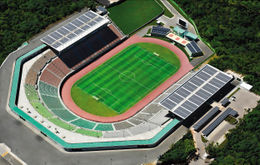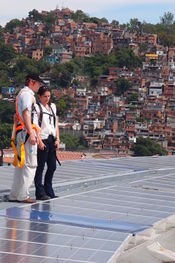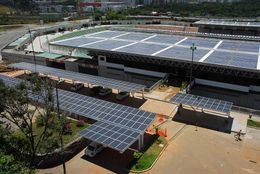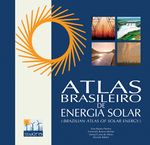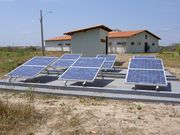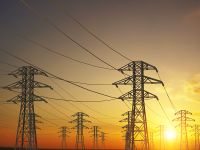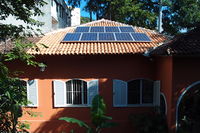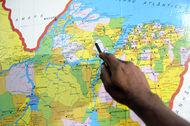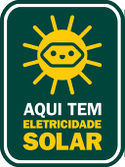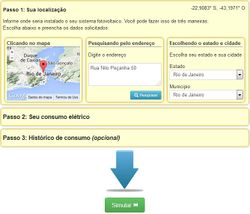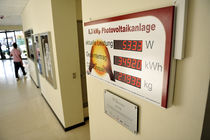Knowledge fuels change - Support energypedia!
For over 10 years, energypedia has been connecting energy experts around the world — helping them share knowledge, learn from each other, and accelerate the global energy transition.
Today, we ask for your support to keep this platform free and accessible to all.
Even a small contribution makes a big difference! If just 10–20% of our 60,000+ monthly visitors donated the equivalent of a cup of coffee — €5 — Energypedia would be fully funded for a whole year.
Is the knowledge you’ve gained through Energypedia this year worth €5 or more?
Your donation keeps the platform running, helps us create new knowledge products, and contributes directly to achieving SDG 7.
Thank you for your support, your donation, big or small, truly matters!
Net Metering in Brazil
Introduction
Currently, solar energy plays just a marginal role in Brazil’s energy supply. The almost endless solar resources has no market for small scale solar systems. However, the new Net Metering regulation 482/2012., introduced by the Brazilian electricity sector regulatory body ANEEL, has finally opened the doors to tap a vast potential for decentralized small scale electricity generation up to 1 MW. It is a big step for Brazil´s renewable energy sector and great opportunities for German technologies in the Brazilian market.
The cooperation of the Deutsche Gesellschaft für Internationale Zusammenarbeit (GIZ) GmbH, acting on behalf of the German Federal Ministry for Economic Cooperation and Development (BMZ), and Brazil in the field of sustainable development is helping the Brazilian partners to develop new ways of tapping the enormous potential for using renewable energies and to promote energy efficiency, particularly in industry and buildings. GIZ provides advice on strategy development, support for developing management and cooperation structures, and technical expertise.
Articles
From the first solar-powered stadium in Latin America to PV Business for everybody (2013)
Vom ersten Solarstation Lateinamerikas zum brasilianischen Net Metering (2013)
In 2012, the first Brazilian photovoltaics pilot project, the solar-powered stadium Pituaçu in Bahia state was inaugurated. This successful venture, implemented by the local energy provider COELBA and supported by Deutsche Gesellschaft für Internationale Zusammenarbeit (GIZ) GmbH, established further progress to increase the share of photovoltaic-generated electricity in the Brazilian energy system. Consequently, ANEEL introduced a Net-Metering system within a new regulation for decentralized small scale electricity generators up to 1 MW.
PV businesses up to 1 MW under Brazils new Net Metering rules (2013)
Net Metering in Brasilien - Wirtschaflichkeit PV für Haushalte und Gewerbe (2013)
This paper assesses the profitability of decentralised electricity generation within the Brazilian housing and commercial sectors using the example of photovoltaics in the context of the introduction of the Net Metering system. The analysis is limited to the low-voltage level, since it has by far the highest retail tariffs.
Net Metering in Brasilien - Bilanz nach einem Jahr (2014)
The article gives a review of the progress of the Brazilian Net-Metering system after approximately one year since its introduction (12/2012). Trends and challenges to new grid connections as well as funding and incentivizing measures are important issues referring to this.
Fact- & Infosheets
Pituaçu Solar - Das erste Solarstadion Brasiliens (2012)
Within the technical visit of a Brazilian delegation in Germany 2009, the idea to utilise public´s attention on world cup 2014 in Brazil to introduce catchpenny photovoltaic projects through football was born. Shortly after, the Brazilian energy supplier COELBA introduced a pilot project to build the first Brazilian solar stadium Pituaçu, with a capacity of 400 kWp. Financed by ANEEL’s Energy Efficiency Program PEE (port. Programa de Eficiência Energética), the German-Brazilian EPC Gehrlicher Ecoluz Solar realized the installation of the system. The Cooperation for Sustainable Development supported the project with technical advice on planning and choosing the execution company as well as obtaining the permission to introduce the produced electricity via net metering into the grid. This successful venture released to investments of 2 Mil. Euro from the Brazilian private sector, applying 60.000 Euro of German public tax resources for the project.
Unbürokratisches Net Metering für dezentrale Stromerzeugung in Brasilien (2013)
Reduce administrative barriers in Brazil to make grid connection of decentralized renewable energy generators viable – that was one aim of the cooperation between ANEEL and the German Cooperation for Sustainable Development in the field of sustainable energy use. Within this fruitful partnership, ANEEL used its regulatory competence to reduce bureaucratization of grid connection, enabling small electricity producers by resolution 482/2012. The German Cooperation for Sustainable Development advised ANEEL on technical and administrative aspects of the introduction of a Net Metering system and organized trainings and technical visits.
Solarpilotprojekt Megawatt Solar (2014)
Strategisches F&E Projekt Photovoltaik Brasilien (2014)
Primeiro programa de incentivo à energia fotovoltaica (2014)
To amplify and diversify the application of financial resources of the ANEEL’s Research & Development Program for renewable energy projects, ANEEL created the Strategical R&D Photovoltaic Project. Since 2011, the Cooperation for Sustainable Development support ANEEL in developing a tender that encouraged energy companies to apply their R&D resources on commercial solar generation plants up to 3 MWp. Thus this measure could significantly improve spending on research and development of renewable energies in Brazil. 18 Photovoltaic projects has since been approved by ANEEL, some of them, for example the world cup solar stadiums Recife, are already realized involving huge private investment. Through the Strategical R&D Photovoltaic Project, 165.000 Euro of German spending led to 100 Mio. Euro Brazilian investment.
Net Metering
Preparation
Brazilian Atlas of Solar Energy (2006)
The Brazilian Solar Energy Atlas includes maps and digital data of various solar radiation components as well as detailed infrastructure and socio-economic parameters. The resulting database is compatible with the Geographical Information Systems (GIS) and therefore may be easily employed in feasibility studies during renewable energy project development. After analysing the temporal and spatial variations and trends of solar energy resources, the atlas presents some solar energy scenarios for Brazil.
Survey of the Electricity Market in Brazil focusing on Distributed Generation (2011)
Estudo sobre o Mercado de Energia Elétrica no Brasil focando na Geração Distribuída (2011)
In Brazil, electricity must be traded in one of two environments of the market, the Regulated Contracting Environment – ACR and the Free Contracting Environment – ACL. This report describes the main characteristics of the two market environments, with the purpose of assessing the possibility of implementing distributed power generation in Brazil through photovoltaic projects. It also indicates the states that are already offering tariff parity. Another conclusion is that in the Brazilian scenario, the metering system in the net-metering mode is more feasible than the feed-in tariff model.
The main objective of this study is to inform about the current regulations, standards, as well as control and measurement methods of reactive power and power factor applied in Europe. Furthermore, the study describes interrelated challenges of and opportunities for the integration of new consumer groups and decentralized renewable energy based power generation.
Implementation of small grid connected decentralized power generators in Brazil (2010)
Implementação de geradores de energia descentralizados no Brasil ligados a uma pequena rede (2010)
This article gives an overview on the renewable energy support policies - Feed-in tariffs and Net Metering - analyzing their legal framework in Germany. It subsequently develops perspectives for Net Metering in Brazil. Further attention is paid on the impact of decentralized generation on load curves and distribution infrastructure.
International Procedures for the Connection of Small Distributed Generators to the Power Grid (2011)
To help ANEEL developing the legal procedures for decentralized distributed generation, this study addresses the legislation in Germany and Italy as reference countries with sharp increase of decentralized power generation plants up to 1 MW, in particular from renewable energies, in the recent years. It gives an overview of the relevant energy law provisions and, in this context, existing contracts between energy operators and grid operators for the interconnection of small distributed power generation plants.
Standards for the Connection of Small Distributed Generators to the Power Grid (2011)
The purpose of this document is to present and compare international technical standards for interconnecting small distributed generation units to the public grid in different European countries (Germany, Italy and Spain) and the United States of America. It also presents recommendations for a simplified connection procedure in coherence with Net Metering.
The report explains the former status quo of the proceedings in costumer-generation projects before the introduction of Net Metering in Brazil. It aims to identify interconnection barriers resulting from regulatory obstacles in Brazil. Therefore, it shows the development of PV in Brazil, an overview of the regulatory framework, rules and proceedings for interconnection of distributed generation at that time and gives recommendations how to interconnect despite the interconnection barriers and advice on incentive schemes within the legal framework.
Consequences on Grid Operation by Decentralized Renewable Power Generators (2011)
In Germany, lately some developments with respect to renewable power generation and its connection to the different voltage levels occurred. Due to the enormous increase of such installations and the fact that renewable power generation units so far have been considered more or less as “negative loads” but without consideration of their capabilities to act in the same way as conventional power plants certain problems arose. This report identifies these problems and discusses the policy measures to address them.
Pesquisa relacionada aos consumidores B3 no Brasil (2012)
This study shows the methodology utilized to calculate the yearly average electricity consume of the Brazilian consumer group B3 (commercial and small industry). To get to know the behaviour of consumer groups is indeed important for the process of tariff revision or the calculation of marginal costs calculation and the basis tariff related to distributed generation.
Metodologia de mapeamento da área potencial de telhados residenciais para PV no Brasil (2012)
To amplify the use of small scale energy generators, this study develops a methodology to estimate and map the potential of residential housing rooftops for electricity and heat generation produced by photovoltaic panels and solar collectors. The methodology regards aspects of the country-specific sun irradiation, total rooftop area and areas improper for use.
This training manual shows how to use the geographical information system GIS in order to map the potential of residential rooftops for electricity and heat generation. It gives instructions over the general use of GIS and the mapping software ArcGIS. Subsequently, the manual describes the use of ArcGIS to identify sun irradiation potentials.
Dissemination / Spreading
Resolutions
- Resolução ANEEL Net Metering 482/2012
- Regulierung Net Metering Nr. 482 der Nationalen Energieagentur ANEEL in Brasilien (2013)
- Verfahrensregeln zur Stromversorgung im nationalen Stromnetz PRODIST (2013)
The resolution 482/2012 adopted by the Brazilian Agency for Electricity ANEEL is the regulatory base for Net Metering for distributed generation in Brazil.
The German Cooperation for Sustainable Development supports the Instituto IDEAL to promote and disseminate renewable energy. Important progress could be achieved through the project America do Sol, which offers information, educational material and online tools on solar energy, photovoltaics and Net Metering.
Mini and Micro Generators - América do Sol
Cartilha Como faço para ter electricidade solar na minha casa? (2012)
This Manual explains in a simplified and illustrated manner all steps to connect a mini or micro generator. It shows how to calculate the financial benefits of distributed solar generation to their user and describes how to request grid connecting at the distribution company.
The Instituto Ideal officially launched an educational manual on Solar Electricity. It aims to inform institutions, schools, media, business and public utility suppliers on the use of small decentralized photovoltaic systems. The manual can be sent to the institutions and can be reprinted and distributed by the institutions themselves to their customers.
This Partnership of the Ideal Institute with the Grüner Strom Label fosters distributed power micro-generation in Brazil through financial support available to home consumers and small businesses for the installation of photovoltaic generators with a capacity of up to 5 kW.
The Solar Label is awarded to companies or public and private institutions that consume a minimum annual value of solar electricity, which varies according to the total amount of energy consumed.
Elaboração do Regulamento do Selo Solar (2011)
This report registers the process of establishment of the Selo Solar as instrument for providing the use of solar electricity. It describes the conception and implementation as well as regularization of Selo Solar and points out some challenges in its application.
Avaliação qualitativa do Selo de Energia Solar Fotovoltaica (2011)
This market study aims to gain insights about the assessment of Selo Solar by the addressed target group. The intention is to gain knowledge about the receptivity of the relating electricity consumers. Therefore, the study uses a qualitative research approach.
Manual de Uso de Selo Solar (2011)
Apoio na elaboração das regras da Campanha Selo Solar (2011)
Solar Simulater (Simulador Solar)
The Solar Simulator is a digital tool that allows to calculate the power from a photovoltaic system (solar electricity generator) that is required to meet the annual power demand of a house, an office or an industry. The tool calculates how much electricity the property would save as well as the total area required on the rooftop or ground area to install the solar panels.
User Manual Solar Simulator (2012)
Solar Company Register (Mapa de Empresas do Setor Fotovoltaico)
Post regulation (Challenges)
Análise e levantamento da composição tarifária brasileira (2013)
The uncertainty about the cost-effectiveness of a small scale photovoltaic installations in Brazil is one mayor reason for the hesitant interest in distributed generation. This uncertainty is related to the unknown compose of the electricity tariffs. The study analyses the Brazilian tariff system of the electricity sector in the low voltage consumers segment, specifically consumer groups B1 (residential) and B3 (commercial and small industry). The analysis aims to build a basis for feasibility studies of PV installations.
Condições de Importação de Equipamentos de Mini e Microgeração Distribuida Fotovoltaicos (2012)
This study aims to address the gap in information about trade conditions and especial taxing for the import and export of components for small scale photovoltaic generation. It tends to offer an overview over the tax conditions to facilitate the entrance of foreign technology producers to step in the Brazilian market. It also points out fiscal benefits of states and other public initiatives and describes the costs for logistics and certification of components.
Histórico da Regulação do Custo de Disponibilidade no Brasil (2013)
In Brazil, one part of the electricty bill of residential consumers is the so called Availability Cost of the Electricity Sector (port. Custo de Disponibilidade do Sistema Elétrico). It is the minimum value charged by the electricity distributer, independently of any electricity consume. The Custo de Disponibilidade is considered as one item that may contribute to doubts about the profitability of small decentralized generation. This article points out the legal basis of the Custo de Disponibilidade, highlighting how ANEEL could use its competencies to alter the regulation in a favourable manner for small distributed generation.
Dezentrale Stromerzeugung durch Photovoltaik in Brasilien - Eine Wirtschaftlichkeitsanalyse (2013)
This thesis assesses the profitability of decentralised electricity generation in the Brazilian commercial sector. It aims to prove if net parity is achieved in relation to the introduction of Net Metering. Therefore, it analyses the electricity supply situation in the commercial sector, the characteristics and macro-economic influence factors of PV in Brazil. Subsequently, the author develops scenarios in which this work concludes whether profitability is given or not.
Análise sobre a instalação do Dispositivo de Seccionamento Visível (DSV) na microgeração (2014)
The obligatory installation of the readily accessible disconnection device (port. Dispositivo de Seccionamento Visível - DSV), a component that visibly guarantees the disconnection of small generation centrals during distribution system maintenance of the provider, is one of the elements required by the PRODIST (port. Procedimentos de Distribuição de Energia Elétrica no Sistema Elétrico Nacional) Module of Resolution 482. This component is not used any more by other countries with a large percentage of photovoltaics like Germany and Italy. The study analyses if the legal requirement of DSV is a barrier on the development of small PV generation.
Retrificação da Regulação DSV ANEEL (2014)
Framework Assessment for the Photovoltaic Business Opportunities in Brazil (2014)
This report describes the legal and administrative framework of Net Metering and distributed generation in Brazil, giving an overview on business opportunities for installing solar PV systems. It shows the current market profile for PV and then develops business models for enabling policy options energy auction system and Net Metering. Challenges and further developments are discussed.
Pilot Project - Solar Stadium Pituaçu
Project Pituaçu
Estádios Solares Opção Sustentável para a Copa 2014 no Brasil (2010)
This study gives information about the Brazilian solar stadiums planned for the football world cup 2014 to defend the projects in terms of profitability and their significance as marketing instrument to stimulate the increase of distributed PV generation in the country. The characteristics of each of the new stadiums are given and the possible PV cover area is calculated. In the World Cup 2014, four stadiums were equipped with FV power plants.
Identificação de empresas alemãs para elaboração do projeto executivo (2010)
To execute the installation of PV modules on the first Brazilian solar stadium Pituaçu, this study identifies and presents five German PV companies.
Fornecimento de dados para empresas interessadas no projeto executivo (2010)
The following paper brings together important data to the Pituaçu stadium as informational basis for the PV companies to make a financial offer for the PV project. It contains construction plans and information about engineering and the COELBA as executing energy distributer. Also it contains an overview of the participating companies.
Tendering Pituaçu
- Solicitação de Proposta Edital
- Edital: Projeto Básico
- Edital: Modelo de Contrato de Prestações de Serviços
- Edital: Modelos
- Edital: Laboratórios aprovados pela COELBA
- Edital: Experiência Prévia da Licitante
- Edital: Avaliação dos Componentes do Sistema Gerador Fotovoltaico
- Edital: Normas Técnicas Aplicáveis
- Edital: Modelo de Carta Proposta
Quality Control Pituaçu
Report on the inspection of the Solar Power Plant Pituaçu (2012)

